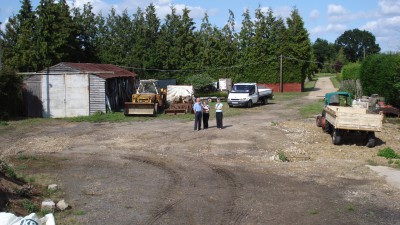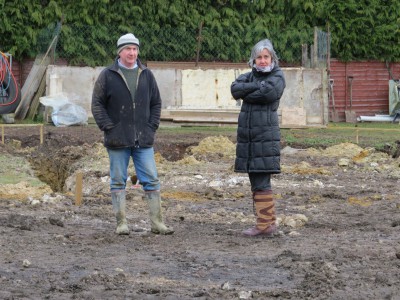A month or so ago we
received an invitation from the West Suffolk Cancer Services User Group,
inviting us to attend a patient forum meeting. Accepting the invitation seemed
like a good idea at the time, but I must confess that it would have been easy
to find an excuse not to attend this morning (Saturday) on a precious day off.
Weekends are always busy fitting in chores etc, and enjoying some much
needed down-time just pottering. With no good reason to offer our
apologies, we duly went along to West Suffolk Hospital this morning, and joined
the other 60+ attendees who have all been affected by cancer, be it as a
sufferer or a partner/carer. John commented that it’s usually good to be
one of the youngest in the room; somehow today it wasn’t such a good feeling.
That said, although most people were older than us, there were a few that
were younger. We were unsure what to expect, but the agenda included
talks by our local MP Jo Churchill (or prospective MP as she needs to be
referred as prior to the General Election on 8th June) who shared her moving,
frank and personal experiences of her two cancer treatments, which prompted her
desire to enter politics to make a positive change to cancer services.
Another speaker was Dr Liz O’Riordan who is a local breast cancer surgeon, who
was also recently diagnosed with stage 3 breast cancer. She spoke eloquently
and honestly, with no notes or Powerpoint presentation, about her experiences from a patient’s perspective. Since
diagnosis Liz has documented her experiences on her website; writes a blog and
is an avid Twitter user. Gosh, I wish we had seen her website when John
was diagnosed in October. It was heartening to hear that many of Liz’s
observations and experiences mirrored ours, and her passion now is to educate
health care professionals so that the patient’s experience can be improved. It was such a relief to hear both Jo and Liz describing their memories of
their diagnosis so vividly, and how it affected them. They are both
clearly highly intelligent individuals, but they both experienced the same
complete shock and raw emotion that we did on hearing the news that no one
wants to hear. I’ve also been interested to hear that many people find it
helpful to keep a diary to document their thoughts. Doing so certainly
helped me when John was first diagnosed, as I would spend endless sleepless
hours going over and over events; scared that I would forget details or
important facts. Writing these feelings down helped me to not dwell on
things that had happened, and focus more on what was to come.
We were also given the opportunity this morning to speak
about our experiences of treatment that we have received (I can’t bear to call
it our ‘cancer journey’ which many people refer to it as). We were able
to speak about things which may appear petty and trivial, but other cancer
patients and health care professionals completely understand and recognise the lasting effect that some minor event or action can have. Such as: 1. Being told that you
have cancer, and then immediately being inundated with facts, figures and
options – going into shock and not being offered a glass of water or cup of tea
which you desperately need. 2. Being quickly ushered into an
adjoining room to have a chat with a nurse to allow the consultant to deliver
news to the couple that were in the queue behind you. 3. Within 30
minutes of diagnosis being provided with a stack of information leaflets which
are put into a black plastic wallet (the wallet of doom which I promptly burned
the next morning). 4. Within 30 minutes of diagnosis being given
information about your sex life during and after treatment (not at the
forefront of your mind at that time!). 5. Being told that there are
2 treatment options (surgery or radiotherapy), but there is no urgency to
decide which treatment to have, only to be told at the next appointment that
the cancer is advanced and there are no treatment options. 6. The
sheer brutality of being told that the cancer is advanced and the prognosis is
4 – 5 years. 7. Poor personal hygiene of consultants that cough
into their hand and then shake yours when you are vulnerable to infections when
having chemotherapy. 8. Reluctance to walk into the Macmillan
support unit due to the presence of a line of sinister looking mannequins
wearing dated wigs. 9. Eventually visiting the Macmillan support
unit (this morning) and focusing on a folder on a shelf marked ‘funeral
information’. These things may seem like a bit of a rant, but the
facilitators did seem genuinely keen to hear of patient’s and carer’s
experiences, and we are hopeful that they will be able to put in place some
changes to improve services in the future. Having said that, other than these
relatively minor points, the treatment that we have received has been
excellent.
So how is John now, 2 weeks
after his 6th chemo? He’s
doing well! He had aimed to start his
phased return to work last week, but fatigue got the better of him, and his
return has now been delayed to next week (all going well). His hair has started to regrow and it is coming back thick and brown/grey, replacing the colourless wiry mat that he’s had since January. We may not have mentioned, but another
side-effect of the chemo treatment is damage to finger nails which become
damaged, discoloured, and brittle. To
prove that he has now had 6 rounds of chemo you can count the lines on his
fingernails:
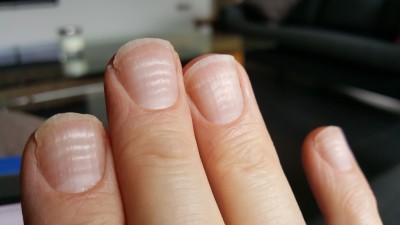
John has completed a
gardening project to lay membrane and bark chippings in our fruit garden. This has been a major task for him, and would
have been completed with far less effort and a lot quicker just a few months
ago, but it’s been a massive achievement for him to complete some manual work
outside.

Next week we have an
appointment with the interim oncologist consultant and we intend to go with a
list of questions. We are entering a
phase which makes many people anxious – treatment comes to an end and you are
left alone to think ‘what happens next’.
On Thursday we are attending
the Building Awards Dinner. Watch this
space for the results!
 The front of the senior school.
The front of the senior school.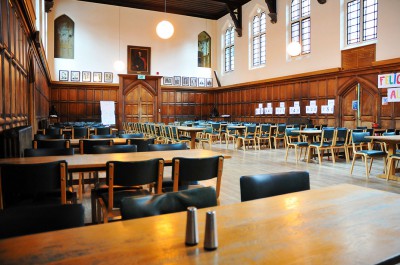 Above – The main dining room. Below is the school’s promotional video.
Above – The main dining room. Below is the school’s promotional video.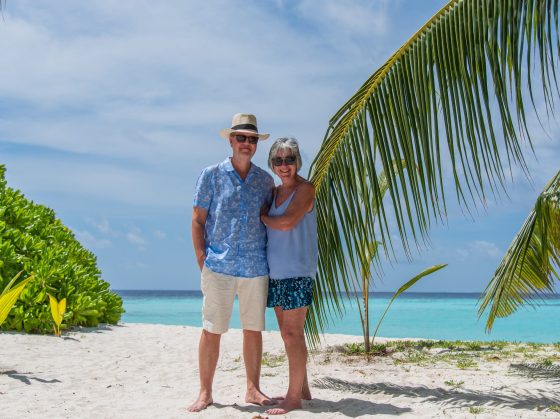
 As I am sure most of you know, we built our own home a couple
As I am sure most of you know, we built our own home a couple